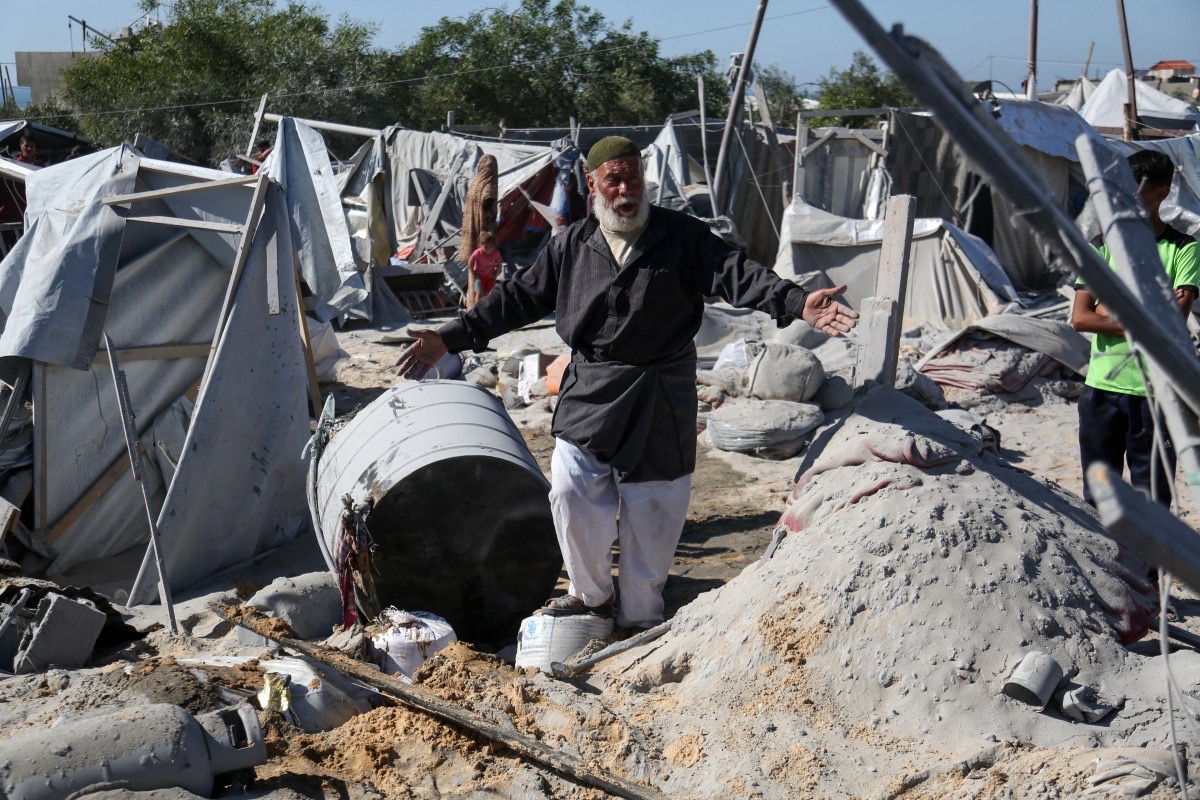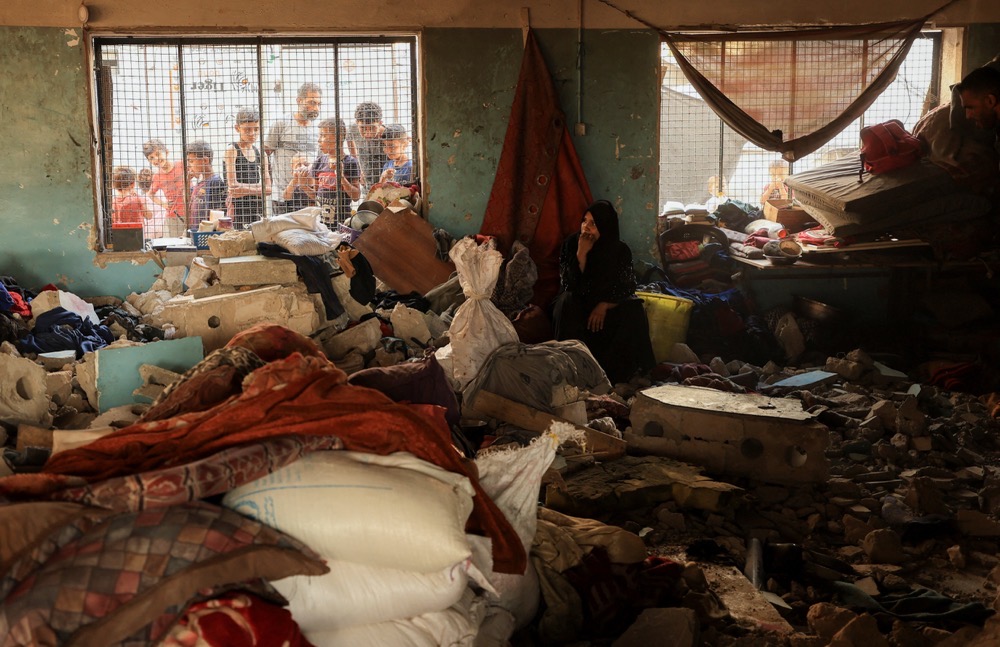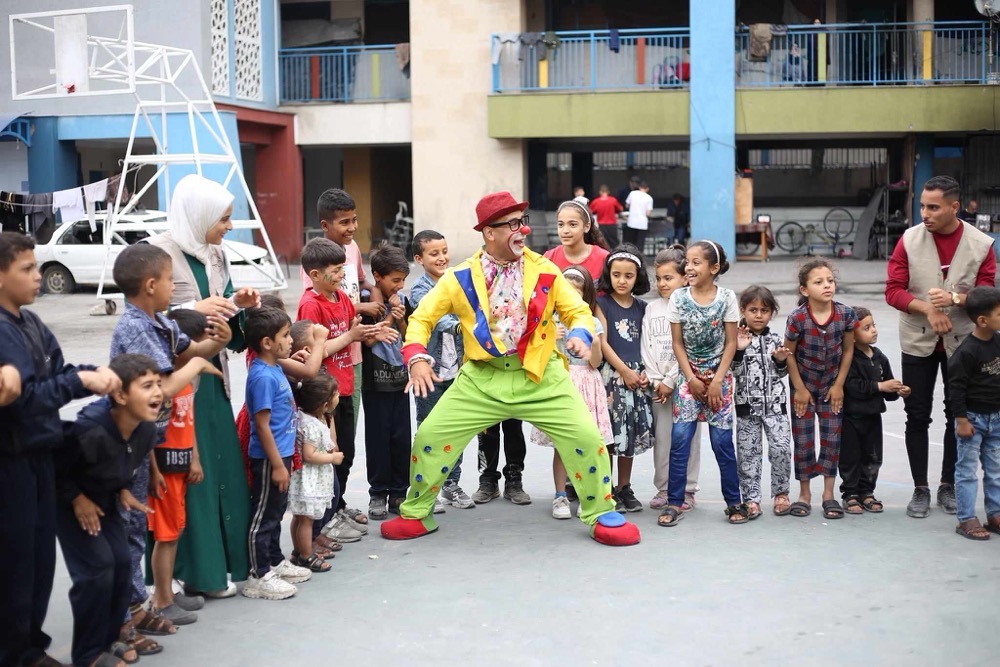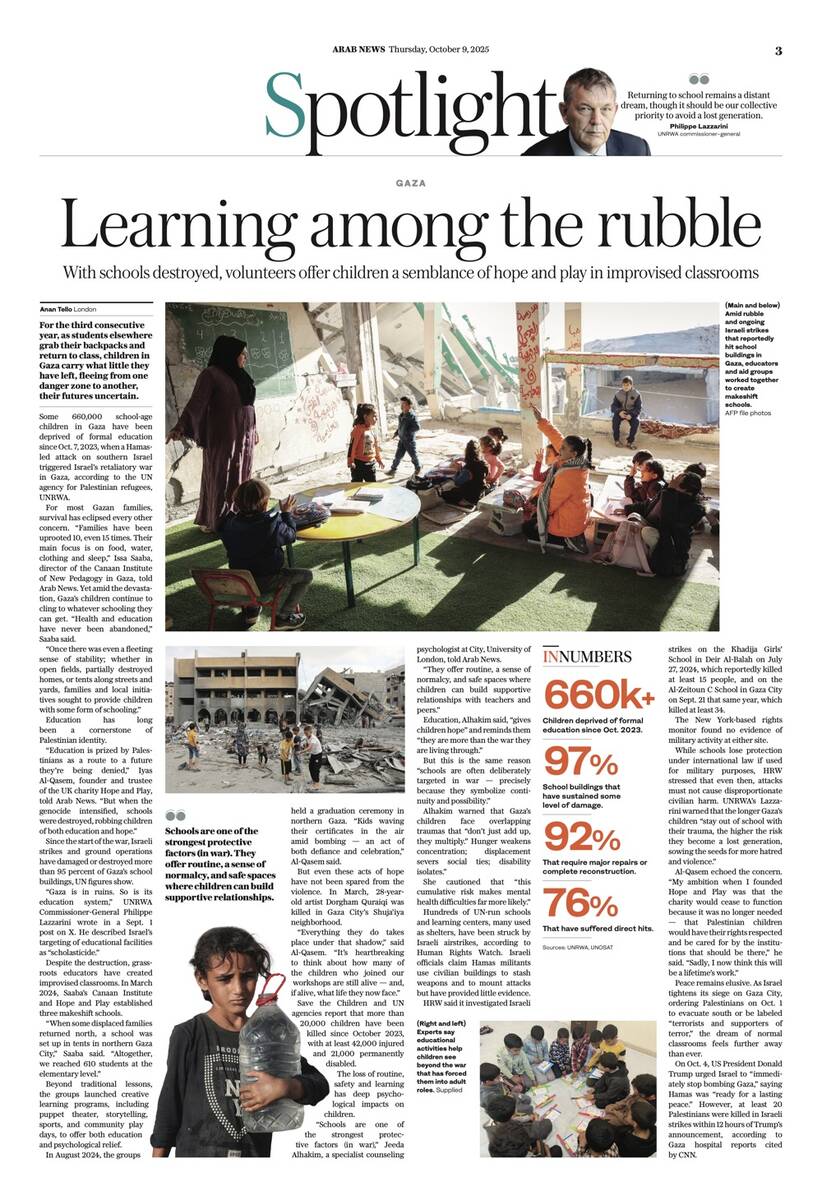LONDON: On Friday, pediatrician Dr. Alaa Al-Najjar, one of a dwindling number of doctors still working in Gaza, left home as usual for another distressing shift in the war-battered Nasser medical complex in Khan Younis.
As she cared for babies and children who had been wounded in air attacks over the previous days, a missile struck her home, killing nine of her own ten children.
Their father, also a doctor, was badly injured in the attack. The couple’s only surviving child, an 11-year-old boy, was brought to his mother’s hospital, where his life was saved on the operating table.

Women mourn relatives killed in an Israeli strike, at Al-Shifa hospital in Gaza City. (AFP)
That same day, more than 50 people, including many young members of a single family, were killed in Jabalia in the north of Gaza.
The poet and author Mosab Abu Toha, who earlier this month won a Pulitzer Prize for a series of essays in The New Yorker magazine, portraying the “physical and emotional carnage in Gaza,” happened to be near the scene.
His harrowing photograph of a dead girl, perhaps only two years old, with most of her head missing, has been viewed tens of thousands of times on X. The eyes of the medic tenderly carrying her body from the rubble of her home told their own story.
Incidents such as these, and the wider humanitarian emergency resulting from renewed violence and a weeks-long aid embargo, appear to have pushed many in the international community to consider the imposition of sanctions on Israel.
Last week, the EU, Israel’s biggest trading partner, announced it was reviewing the EU-Israel Association Agreement, in particular Article 2, which states that the relationship “shall be based on respect for human rights and democratic principles.”

The US seems unlikely to single out Israeli leaders for sanctions and would almost certainly veto any proposed action by the UN Security Council.(AFP)
Also last week, the UK, France and Canada issued a joint statement condemning the situations in Gaza and the West Bank, denouncing “the level of human suffering in Gaza” as “intolerable.”
Warning that Israel was risking “breaching international humanitarian law,” it added: “We will not stand by while the Netanyahu government pursues these egregious actions.”
Then came the unprecedented threat: “If Israel does not cease the renewed military offensive and lift its restrictions on humanitarian aid, we will take further concrete actions in response.”
In response to these calls for “concrete actions,” Israeli Prime Minister Benjamin Netanyahu launched a blistering attack on the leaders of the UK, France and Canada, saying that they had “effectively said they want Hamas to remain in power.”
He also accused them of siding with “mass murderers, rapists, baby killers and kidnappers.”
Israel began military operations in Gaza in retaliation for the unprecedented Oct. 7, 2023, Hamas-led attack on southern Israel, which resulted in some 1,200 deaths, the majority of them civilians, and about 250 people being taken hostage.

At least 54,000 Palestinians, the majority of them women and children, have been killed in Gaza. (AFP)
Eighteen months on, at least 54,000 Palestinians, the majority of them women and children, have been killed in Gaza, according to local health officials, while all but a handful of the hostages have been released or killed in the crossfire.
On Monday, at a summit in Madrid of European and Arab nations, including Saudi Arabia, Spain’s foreign minister Jose Manuel Albares called for an arms embargo on Israel and sanctions against individuals “who want to ruin the two-state solution forever.”
Speaking before the meeting, Albares said that humanitarian aid must enter Gaza “massively, without conditions and without limits, and not controlled by Israel,” describing the Strip as humanity’s “open wound.”
“Silence in these moments is complicity in this massacre,” he added.
Saudi Arabia has long called on the US and other Western nations to freeze arms shipments to Israel in response to its restrictions on the flow of humanitarian aid into the embattled enclave.

Also on Monday, more than 800 lawyers, academics and retired senior judges in the UK signed an open letter expressing “our deep concern over the worsening catastrophe in the occupied Palestinian territory.”
They urged the British government to meet its “fundamental international legal obligations … to take all reasonable steps within (its) power to prevent and punish genocide (and) to ensure respect for international humanitarian law.”
Israel’s attacks “are quite clearly and blatantly in disregard of international law, and are just becoming unacceptable,” Guy Goodwin-Gill, emeritus professor of international refugee law at the University of Oxford and one of the letter’s signatories, told Arab News.

Saudi Arabia has long called on the US and other Western nations to freeze arms shipments to Israel in response to its restrictions on the flow of humanitarian aid into the embattled enclave. (AFP)
What happens next, he said, “depends to a certain extent upon the willingness of other states to come to the party.”
The US seems unlikely to single out Israeli leaders for sanctions and would almost certainly veto any proposed action by the UN Security Council.
“But I think the UK could impose financial and immigration sanctions, not only on Israeli ministers and officials suspected of involvement in the unlawful conduct but, in my personal view, it should consider imposing visas on all Israelis,” Goodwin-Gill said.
“Given the extent of conscription in the country, all Israelis have been potentially involved in the actions of the military on the ground — the tank commanders, the soldiers, and the air force pilots in particular.
“I think they should be subject to a visa requirement, subject to inquiries about what they were doing during the war.”
The Israeli government’s standard response to any criticism is to accuse its critics of antisemitism. The signatories nevertheless decided to speak out.
“I think there was an apprehension about being labeled antisemitic,” Goodwin-Gill said.
“But I think that is disappearing with the continuing violations of international humanitarian law that are going on and on, and in the face of evident desire on the part of some in the Israeli government to bring about the destruction of Gaza, the destruction of the aim of a two-state solution, and the end of the prospect of any self-determination for Palestinians.”
In addition to the events in Gaza, “the extent to which settlers are invading the West Bank and assaulting Palestinians, not only with the passive support of the Israel Defense Forces, but also being armed by them, is beginning to put people on notice that the label of ‘antisemitism’ is not going to stick this time.”

People watch as smoke billows following an Israeli strike in Jabalia. (AFP)
It isn’t just the UK’s legal community that is breaking cover to openly criticize Israel’s actions. On Wednesday, 380 writers, musicians and organizations signed a letter accusing the Israeli government of genocide and calling for an immediate ceasefire in Gaza.
“The government of Israel has renewed its assault on Gaza with unrestrained brutality,” the letter read.
“Public statements by Israeli ministers Bezalel Smotrich and Itamar Ben Gvir openly express genocidal intentions. The use of the words ‘genocide’ or ‘acts of genocide’ to describe what is happening in Gaza is no longer debated by international legal experts or human rights organizations.”
On May 7, a statement signed by more than 30 UN human rights special rapporteurs and independent experts condemned what is happening in Gaza as “one of the most ostentatious and merciless manifestations of the desecration of human life and dignity.”
They added: “While states debate terminology — is it or is it not genocide? — Israel continues its relentless destruction of life in Gaza, through attacks by land, air and sea, displacing and massacring the surviving population with impunity.
“No one is spared — not the children, persons with disabilities, nursing mothers, journalists, health professionals, aid workers, or hostages. Since breaking the ceasefire, Israel has killed hundreds of Palestinians, many daily — peaking on March 18, 2025, with 600 casualties in 24 hours, 400 of whom were children.”

On Wednesday, 380 writers, musicians and organizations signed a letter accusing the Israeli government of genocide and calling for an immediate ceasefire in Gaza. (AFP)
The signatories of Wednesday’s letter wrote: “We refuse to be a public of bystander-approvers. This is not only about our common humanity and all human rights; this is about our moral fitness as the writers of our time, which diminishes with every day we refuse to speak out and denounce this crime.”
The British government has not yet spelled out what “concrete actions” it might take against the Israeli government.
So far it has imposed sanctions only on several settler leaders, accused of “engaging in, facilitating, inciting or providing support for activity which amounts to a serious abuse of the right of individuals not to be subjected to cruel, inhuman, or degrading treatment or punishment” and who have “threatened and perpetrated acts of aggression and violence against Palestinian individuals in the West Bank.”
Several organizations “involved in facilitating, inciting, promoting and providing logistical and financial support for the establishment of illegal outposts and forced displacement of Palestinians in Israel and the Occupied Palestinian Territories,” have also been sanctioned.
In all cases the named individuals and organizations have been subjected to “asset freeze, director disqualification sanction, and travel bans.”

The wider humanitarian emergency resulting from renewed violence and a weeks-long aid embargo, appear to have pushed many in the international community to consider the imposition of sanctions on Israel. (AFP)
In reality, said Michael O’Kane, senior partner at UK law firm Peters & Peters and co-founder of legal guidance website Global Sanctions, it is “very unlikely” that any of those sanctioned so far actually have any assets in the UK, and “that is true of the vast majority of people who are sanctioned by the UK government.
“If you take Russia as an example, there are over 2,000 people on the sanctions list, and I suspect only a very small percentage of them have any assets in the UK.”
Such sanctioning is, however, more than merely tokenistic.
“This is what’s called ‘signaling,’” O’Kane told Arab News. “The government is saying: ‘By sanctioning you, we are signaling to you and to the wider world that we consider your conduct to be unacceptable, a breach of international norms.’”
However, there have been increasing calls for targeted financial sanctions to be imposed on members of Netanyahu’s government, in particular national security minister Ben-Givr and finance minister Smotrich.
“If things continue to go in the same direction in Gaza, I wouldn’t rule out the possibility of that happening,” O’Kane said.
There is also the possibility that the UK government could tighten restrictions on the export of arms to Israel.
In September last year the government suspended about 30 export licenses “for items used in the current conflict in Gaza … following a review of Israel’s compliance with international humanitarian law.”

“Gaza needs an immediate scale-up of food assistance. This is the only way to reassure people that they will not starve,” WFP said in a statement. (AFP)
However, more than 300 arms licenses remain unaffected. A case brought by the Palestinian rights organization Al-Haq, challenging the government’s decision to allow the export of components for F-35 fighter aircraft to continue, is under review in the UK’s High Court.
The government’s lawyers told the court this week that “no evidence has been seen that Israel is deliberately targeting civilian women or children.”
At the start of the case on May 13, Raza Husain KC, the lawyer acting for Al-Haq, told the court that, on the contrary, “acts of annihilation have been accompanied by persistent genocidal, dehumanizing and even celebratory statements made at all levels of the Israeli military and political structure, including such figures, I regret to say, as the prime minister, president, minister of defense, minister of national security, and minister of finance.”
Even if nothing comes of the threats by the EU, the UK and Canada to directly target Israeli ministers, the combined outrage at Israel’s behavior is creating political momentum behind a joint French-Saudi international conference that will open on June 17 at the UN in New York.

More than 30 UN human rights special rapporteurs and independent experts condemned what is happening in Gaza. (AFP)
Anne-Claire Legendre, the French president’s adviser, told a preparatory meeting at the UN on May 23 that “faced with facts on the ground, the prospect of a Palestinian state must be maintained.
“Irreversible steps and concrete measures for its implementation are necessary. This is the purpose of the international conference to be held in June.”





































